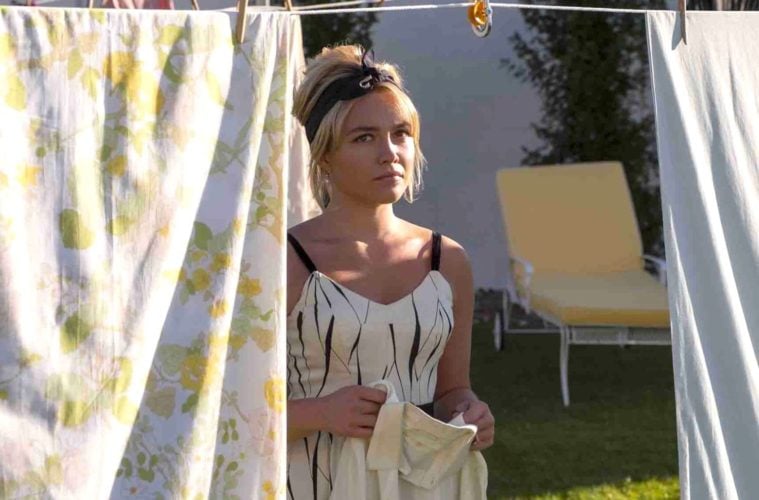 Since we don’t care at all about the director-star squabbling that has beset Don’t Worry Darling—it’s hardly Herzog and Klaus Kinski circling each other with pistols in the Amazon—we can settle on the film, which is a classic kind of gotcha movie. It’s almost a subgenre: movies that are so obviously constructed around a Big Secret that you end up working out three or four solutions to the puzzle long before the script dishes out its reveal. Did your ideas turn out better? It can be a fun and proactive viewing mode, like parsing a multiple-suspect murder mystery, but bigger, more conceptual, even if it leaves little oxygen behind for whatever tension or payout the movie otherwise aims to deliver.
Since we don’t care at all about the director-star squabbling that has beset Don’t Worry Darling—it’s hardly Herzog and Klaus Kinski circling each other with pistols in the Amazon—we can settle on the film, which is a classic kind of gotcha movie. It’s almost a subgenre: movies that are so obviously constructed around a Big Secret that you end up working out three or four solutions to the puzzle long before the script dishes out its reveal. Did your ideas turn out better? It can be a fun and proactive viewing mode, like parsing a multiple-suspect murder mystery, but bigger, more conceptual, even if it leaves little oxygen behind for whatever tension or payout the movie otherwise aims to deliver.
Right away, you know something’s off: Alice (Florence Pugh) and Jack (Harry Styles) are a young couple living in a high-partying desert community, in what seems to be 1958—except it’s a weird 1958, hyperbolic, glossy, fetishistic of ’50s clothes and furniture and linoleum as only an ironic-retro re-creation of the era could be. Is it a movie set? A Pat Buchanan daydream? Do these people know they’re in a re-creation? The husbands drive color-coded cars out of their sun-blasted cul-de-sac as their color-coded wives wave them adieu, similar to the more openly parodic Edward Scissorhands. When the men return, they’re greeted with highballs, roast dinners, and sex on the dining room table. There are hints that this could be a kind of culty master-planned community, with constant radio self-empowerment messages and a rakish local leader given to “we belong together” speeches (Chris Pine, riffing like a George Clooney Jr.). The outside world is verboten—the desert is off-limits, and virtually nothing is said about what’s going on in the America beyond the community’s borders.
So we smell a hidden agenda. A parody of Disney’s Celebration, Florida? Pugh’s Alice seems, oddly, perfectly fine with whatever this veil of nostalgic bullshit turns out to be—odd because Pugh is a distinctly fierce and alert presence, probably incapable of playing a dope, much less someone who happily scrubs her ranch house in rubber gloves all day. But touches of unease can be spotted in various characters—the wives, mostly—and eventually Alice spots a plane go down over the far mountains, propelling her to walk into the desert alone, climb to the top of a spiral-road hill, and find … the truth, sort of.
I cannot list the five or more films that director Olivia Wilde and screenwriter Katie Silberman lift from without throwing a spoiler party (other reviewers have not been so upstanding), but suffice it to say that Alice’s blind faith and commitment to the illusion she lives in begins to splinter, slowly setting the whole community on edge. By 1950s-conformism standards, she of course becomes a classic mad housewife, an unstable quantity violating the collective’s norms, and for a few heartbeats the paradigm resonates like it always has, in and out of movies in the postwar era. Alice is even subjected to electro-shock, ’50s-style, à la One Flew Over the Cuckoo’s Nest, perhaps the anthem movie for embattled nonconformism (and not a spoiler).
But you know the Mega-Twist is coming at you, like a safe dropped from a high window. Texturally, Don’t Worry Darling turns out to be a bit of a low-bore contest of sensibilities—perhaps like the film’s behind-the-scenes scuffles—with Wilde’s haphazard directorial style in one corner (lots of subjective hallucination-or-memory montages, a repetitive slow-boil pacing that’s sometimes hardly heated at all) and Pugh’s instinctive intelligence in the other. Frankly, if Pugh recited my phone bill I’d pay it twice; hopefully one day she’ll find another movie, like 2016’s Lady Macbeth, worth her piss and vinegar.
Styles, in over his head, often comes off as Pugh’s grad student boy toy. All the same, Wilde’s film has its wins, mostly in how sharp-eyed it manages to be about the violent insistence of conservative male fantasias (like The Stepford Wives, also not technically a spoiler). Especially as its anger is aimed at the hapless Styles—in the flare of Pugh’s gaze—the movie whips a familiar target, but ends up making its lashes felt.
Editor’s note: The disclaimer below refers to advertising posts and does not apply to this or any other editorial stories. LA Weekly editorial does not and will not sell content.
Advertising disclosure: We may receive compensation for some of the links in our stories. Thank you for supporting LA Weekly and our advertisers.

